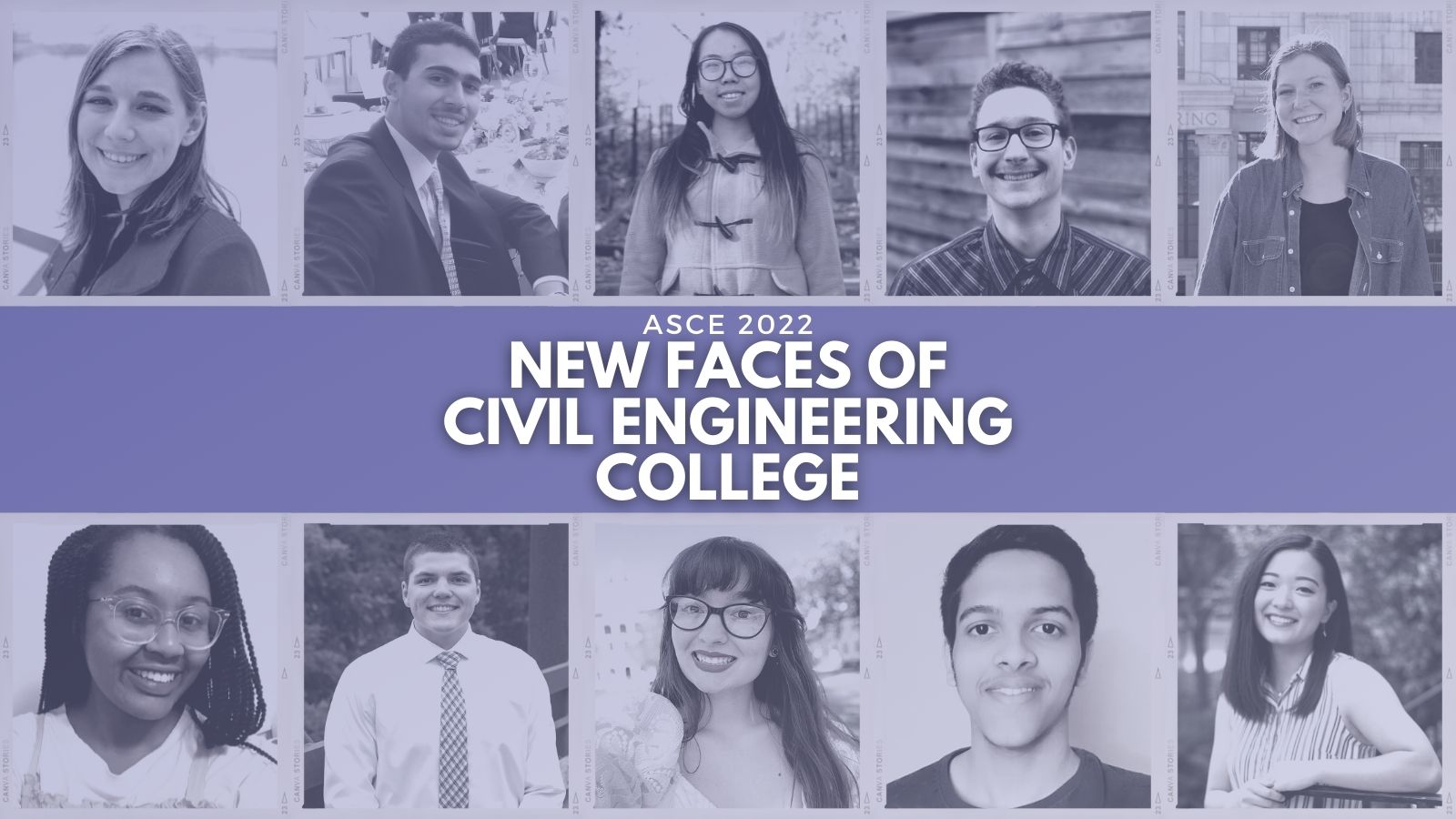
Each year ASCE chooses a cohort of students as the collegiate New Faces of Civil Engineering. These young adults are super achievers who personify the promise of the profession. Get to know these impressive future colleagues and what has motivated them to pursue civil engineering careers.
Here are ASCE’s New Faces of Civil Engineering – College for 2022:
Salaheddine Al Wazzan
American University of Beirut, Lebanon – civil and environmental engineering
Fueled by a childhood passion for science, Salaheddine Al Wazzan was driven to go into engineering in part due to witnessing many infrastructure challenges in Beirut, among them the extensive damage caused by the massive explosion at the city’s port in August 2020. The situation in his country was such that his family was initially opposed to his career choice, but he stood firm and won them over.
“My love for finding innovative solutions to difficult problems drove me into the hands of this broad field, but my love for structures and their effect on communities sealed the deal when it came to choosing engineering,” Wazzan said.
Joining the ASCE student chapter at the American University of Beirut also convinced him he’d made the right choice of major: “Volunteering changed the way I live, and it made me appreciate what I had on a whole other level. Without ASCE-AUB, I may have ended up in business school.”
Jacob Atkins
Oregon State University – civil engineering, forest engineering
As the profession increasingly embraces sustainability in project design and construction, watch for innovations to come from Jacob Atkins. He’s eager to fuse concepts from his double major in civil engineering and forest engineering into ways of leveraging renewable and recycled building materials.
“After working in the wood structures lab at Oregon State University for the past year, everything is starting to come together in my mind,” Atkins said. “I would like to work in a capacity where I can use both my civil engineering knowledge as well as my forestry knowledge to advance these programs even further.”
Atkins also has developed leadership and management chops as the executive officer of ASCE’s Oregon State University Student Chapter, as president of the Xi Sigma Pi Forestry Honors Society Chapter and of the university’s Forest Utilization Society Student Chapter, among others. He’s working to guide the ASCE chapter through a large-scale community service activity in the year ahead.
Alysha Curtis
California State University, Fresno – civil engineering, construction management
An advocate for greater inclusivity in the profession, Alysha Curtis has been heavily involved in Fresno State University’s Society of Women Engineers and Society of Hispanic Professional Engineers student chapters, plus as of January, as president of the university’s ASCE student chapter.
She is also active with ASCE’s Student Presidential Group (representing the Construction Institute) and Student Ambassador Program, helping to elevate the voices of students in Society decision-making.
Curtis’s academic focus is on environmental and construction engineering with an emphasis on water resources. “One day I want to aid in efforts to promote creating a positive impact on the environment by promoting best ecofriendly practices, learning how to implement objectives while not depleting limited resources, introducing renewable energy systems, and recreating sustainable environments once destroyed by human involvement.”
Leah Mealey
University of California, Berkeley – civil engineering, data science
A passion for the environment, inspired by volunteering with the Texas Conservation Corps to restore trails and natural habitats, motivated Leah Mealey to major in civil engineering. “I’m also inspired by the unique challenges that climate change presents, and the solutions engineers are finding to mitigate the consequences,” she said.
“Similar to the way bioengineers and doctors have created COVID vaccines, civil and environmental engineers will provide something similar against climate change in our infrastructural and technological adaptations,” Mealey said. “Serving the community has always been of great interest to me, and climate change mitigation will probably be the greatest opportunity to do just that in my career.”
Playing an active role in the ASCE student chapter at her UC Berkeley campus also has served Mealey well as she enhances her aptitude as a leader. Currently the chapter’s vice president and last year its philanthropy chair, Mealey led a committee in a successful fundraising drive for Habitat for Humanity.
Yanqing Liang
Stevens Institute of Technology – civil engineering, water resources
Yanqing Liang looks forward to applying her civil engineering skills to uplift communities. She sees it as a way of giving back for the support she received from her North Plainfield, New Jersey community after losing both parents to cancer when she was in seventh grade.
Attending Stevens Institute of Technology in New Jersey as a cooperative education student, alternating between academic semesters and internship semesters, has given Liang a jump on real-world engineering experience. “My co-op terms have had a huge impact and shaped my vision for my future. In fall 2018 I worked at Michael Baker International as a water resources intern. [It] ultimately set me on the path I am currently taking of pursuing a water resources concentration.”
“The opportunities I have been given and the experiences I have been through all nudged me into a STEM field where I can create positive impacts for my community,” Liang said. “I am really looking forward to opportunities to be part of the efforts to design sustainable and safe infrastructure.”
Natalie Neptune
Penn State University Harrisburg – civil engineering
Growing up exposed to intercultural experiences as a Black girl in an Asian Indian community, then learning more about world cultures in high school served as Natalie Neptune’s gateway into the world of civil engineering. Joining the Penn State Harrisburg ASCE Student Chapter further inspired Neptune, introducing her to postgraduate students involved in civil engineering research. She’s continued her association with ASCE as a student ambassador.
Neptune describes herself as having a creative, innovative streak that helps her think of novel ideas and solutions to engineering problems. An internship experience with a startup firm in California excited her about the potential of a career with other startups. “I plan to be a spokesperson for the engineering company I eventually work for because I love public speaking and creating content,” she said.
She’s further excited by the possibilities that a career in civil engineering may open. “The problem-solving and hard skills can be implemented and modified to fit other professions and make an individual a key asset to any company … . This is what I love about civil engineering, because I am able to apply this mindset to other fields.”
Tiffany Ritch
University of North Florida – civil engineering
Having a talent for math was the ticket to a promising career in civil engineering for Tiffany Ritch, a talent that also helped her rise out of a period of homelessness in her youth. Watching her mother struggle to make ends meet drove Ritch to begin pursuing a college education while still in high school.
As she held down two jobs at local restaurants, Ritch learned calculus at Santa Fe College from a former engineer and realized her aptitude would lead to civil engineering success. “I chose civil engineering because I wanted to make the world a better place to live, and I still do,” she said. “And with the career I’ve chosen, I can do that every day.”
Continuing her education at the University of North Florida, Ritch joined the school’s ASCE student chapter, where as its fundraising chair she has raised more than $2,500. “Participating in ASCE UNF changed my college career by forcing me to have courage and believe in myself.” She has also grown in confidence and leadership through involvement in the Society of Women Engineers and the Florida Engineering Society. Examining layers of road pavement during an internship sealed a commitment to specialize in transportation engineering.
Eli Trast
University of Wisconsin-Platteville – civil engineering, mathematics
Living adjacent to several farms in rural Wisconsin, in a house with a well and septic system, exposed Eli Trast to the problems of groundwater contamination. “I decided to study civil engineering so I could be proactive in coming up with solutions to protect streams, rivers, lakes, and groundwater resources while trying to balance the need of farmers to efficiently manage their farming operations,” Trast said. “But the challenges really go beyond farmers and include stormwater management and surface water runoff from all development.”
Right from the start at the University of Wisconsin-Platteville, Trast jumped into membership in the ASCE student chapter there, rising quickly to become vice president and coordinating the chapter’s activities by the end of his first year. He was the impetus behind the university’s serving as host of the 2021 ASCE National Concrete Canoe Competition, and he helped it succeed as an all-virtual event because of the COVID-19 pandemic. He served as 2020-21 chapter president.
From his interest in groundwater, Trast’s education has gone on a tangent into geotechnical engineering, prompted by positive experiences during internships. He plans to seek an advanced degree in the specialty. “Helping others solve their engineering problems and helping society move forward together excites me about my future as an engineer.”
Abhishek Vijayan
National Institute of Technology, Tiruchirappalli, India – civil engineering, management
Around the National Institute of Technology campus, Abhishek Vijayan’s leadership abilities are well established and well known. Each fall, NIT-T stages “Festember,” south India’s most significant cultural and charitable festival. Vijayan has served as deputy manager of the festival, in charge of attracting talent from around the world to appear at the festival to deliver motivational speeches. He leads fundraising for the festival’s associated charities, including children’s rights and a COVID relief fund.
Vijayan also is a leader of Builder’s Hive, NIT-T’s highly active civil engineering club. He coordinates club projects focused on civil engineering’s societal impacts, with a view toward applying science and technology to arrive at sustainable solutions. The university does not as yet have an ASCE student chapter, but he aims to launch one in the year ahead. “I would love to connect and collaborate ASCE with NIT-T for enhancing the skills and evolution in the domain of civil engineering, enabling the students to make a bigger difference and building a better quality of life,” he said.
He looks ahead to a future in a profession that he sees as increasingly automated. “I believe that within 20 to 30 years, everything can be controlled in an easy way starting from transportation to construction, which can significantly reduce the time and can effectively improve the standard of living.”
Zoe Zhang
Georgia Institute of Technology – civil engineering, architecture
Embracing civil engineering as a major and future career, and participating in her Georgia Tech ASCE student chapter are closely intertwined for Zoe Zhang. Currently its president, Zhang jumped into the chapter and its activities from the start of her freshman year, including work on the concrete canoe and steel bridge teams. She cites such involvement as instrumental in growing her leadership skills, and now she’s working to instill in younger chapter members the same sense of excitement she has felt.
Combining civil engineering with a minor in architecture has inspired Zhang to explore sustainable reuse of materials. An internship helped her research and apply uses for discarded wind turbine blades, including reusing blades in pedestrian bridges. “My research interests have drawn me more toward the path of material reuse, diagnostics, and rehabilitation of existing structures,” she said.
Zhang is looking forward to working in a civil engineering industry that increasingly embraces diversity and sustainability. “With so much of our world and our built environment changing every year … I am excited to one day tackle these challenges alongside the most creative and capable civil engineers that the industry has ever seen.”



